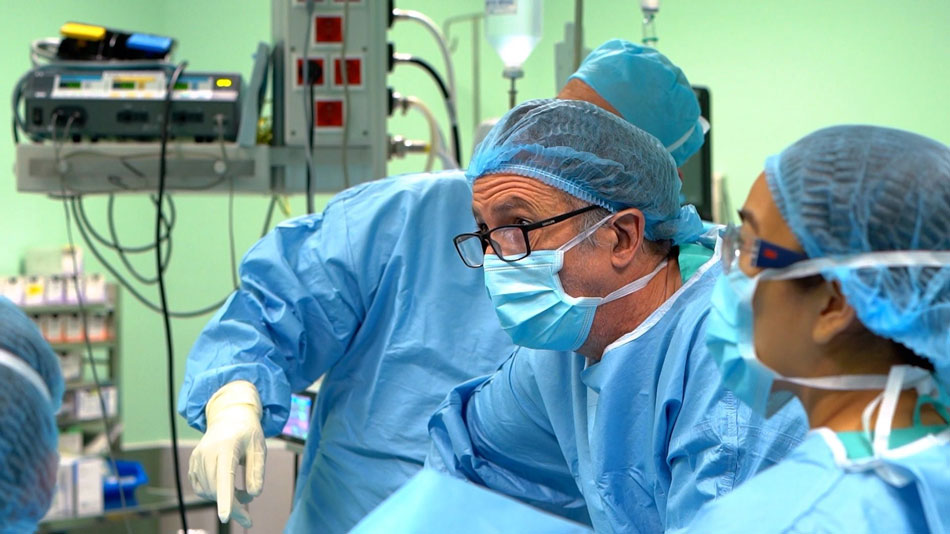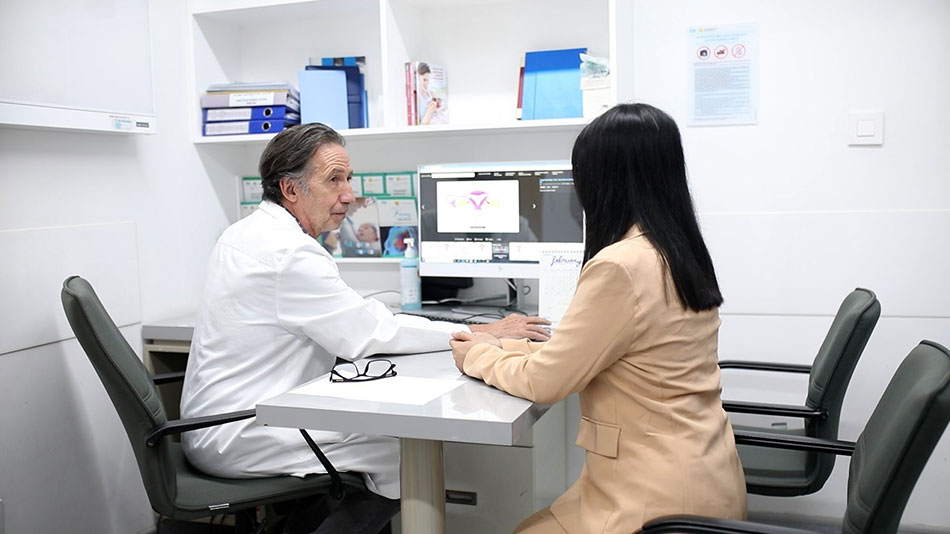The number of patients with endometrial cancer is increasing rapidly and the people developing it are getting younger – FV Hospital has recorded endometrial cancer cases in patients under the age of 45.
Abnormal vaginal bleeding: A common warning sign of gynaecological cancer
In January 2023, FV Hospital doctors performed a metastatic lymph node dissection surgery on a patient with gynaecological cancer. The female patient is a little over 30 years old. Two years ago, after regularly experiencing abnormal vaginal bleeding, she visited FV Hospital for a check-up. The results of intensive examination showed that she had Stage 3C endometrial cancer (also known as uterine cancer) which was progressing rapidly to Stage 4.
At that time, FV Hospital doctors performed a preliminary surgery but could not remove all of the tumours because the cancer had metastasised and invaded her pelvis. After six cycles of chemotherapy, she was assigned a second surgery to dredge the metastatic nodes before switching to radiation therapy.

Dr Gilles Blache performed laparoscopic surgery to treat endometrial cancer
The surgery was performed by Dr Gilles Blache, Head of Obstetrics and Gynaecology, FV Hospital, via laparoscopy and yielded good results. This is a difficult technique that must be performed by a skilled, experienced surgeon. The outstanding advantage of this method is that it is less invasive and shortens recovery time. In addition to removing the metastatic lymph nodes, during surgery, the doctor also injects chemicals to mark the location where radiation therapy needs to be focused for the next round of treatment.
A few weeks later, Dr Gilles Blache was also the chief surgeon for a similar surgery on a 43-year-old patient who had also been diagnosed with endometrial cancer after noticing unusual vaginal bleeding.
Endometrial adenocarcinomas are the most common endometrial cancers. This gynaecological disease is more typical in high-income countries where obesity rates are high.
According to the American Cancer Society, endometrial cancer is the most common gynaecological cancer in the US, a country of more than 330 million people. This year, the organisation estimates that 66,200 cases of endometrial cancer will be diagnosed in the US, and 13,030 women will die from this form of cancer. The disease is detected mainly in post-menopausal women, and most cases are diagnosed between 45 and 74 years old.
In Vietnam, the rate of patients with endometrial cancer is still lower than breast cancer and gynaecological cancers such as cervical cancer and ovarian cancer, but Dr Gilles Blache says that the incidence of this disease is increasing rapidly and patients are trending younger. The two patients mentioned above are typical examples.
Women should actively be screen for gynaecological cancers
Many factors lead to endometrial cancer: age (particularly in women over 45), obesity, use of tamoxifen for more than two years, Lynch syndrome, and previous pelvic radiation therapy. Excessive storage of the hormone oestrogen is considered one of the leading risk factors, which can be due to obesity, polycystic ovary syndrome, progesterone-free oestrogen therapy, never becoming pregnant, early onset of menstruation, and late menopause. Studies also show that around five per cent of endometrial cancers are caused by genetic mutations.

“Women should be screened periodically for gynaecological cancers,” says Dr Gilles Blache
Although the majority of cases of abnormal vaginal bleeding do not indicate endometrial cancer; more than 90 per cent of women with endometrial cancer experience abnormal bleeding, including postmenopausal bleeding, perimenopause bleeding, and ovulatory dysfunction. According to Dr Gilles Blache, when the disease is in its early stages, if treated promptly, the average five-year survival rate is between 70 and 95 per cent. The survival rate is only 10 to 60 per cent once the cancer has reached its late stages.
The rate of gynaecological cancers like cervical cancer and endometrial cancer is increasing rapidly. Dr Gilles Blache recommends that women periodically screen for this category of cancer, monitor their general health and ensure they receive timely medical intervention instead of waiting for more severe signs to present before visiting their doctor. Treatment of gynaecological cancers at an advanced stage is often complicated and difficult; screening can help detect the disease at stage 0 when the treatment process will be more straightforward and the chance of successful treatment is very high.
“Most patients only think about seeing a doctor when they have a disease and do not consider prevention. Most patients who come to see a doctor want to be cured of the disease and symptoms they’re experiencing, but prevention, screening and treatment must go hand-in-hand,” adds Dr Blache.

Dr Gilles Blache counsels a patient about endometrial cancer
FV Hospital’s dedicated Obstetrics & Gynaecology Department, staffed by world-class specialists and equipped with the latest tools and technologies, offers screening and surgery for gynaecological cancer. The department is led by Dr Gilles Blache, an expert with more than 30 years of experience in conservative surgery in breast cancer treatment, laparoscopic pelvic surgery, and pelvic cancer surgery. Dr Blache is skilled at treating various complicated gynaecological cancers via minimally invasive methods, ensuring his patients enjoy an optimal quality of life following treatment.
FV is a general hospital where departments collaborate closely. Oncology patients will continue to be monitored and treated at Hy Vong Cancer Care Centre after tumours have been surgically removed. This protocol is not only more convenient for the patient but allows doctors to consult regularly to develop the most suitable personalised regimen for every individual.
“At FV, we always discuss all possible solutions with patients. At other hospitals, some solutions are non-existent or unfeasible, but FV can offer patients more options to achieve the best possible outcomes,” says Dr Blache, Head of Obstetrics and Gynaecology.
To be screened for gynaecological diseases and cancers, please contact Obstetrics & Gynaecology and Breast Care Clinic, FV Hospital, at (028) 54 11 33 33, extension 6000.

 Vi
Vi 












